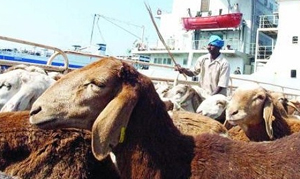 Jeddah, Oct 15: The impact of the Nitaqat campaign on the sheep and goat markets is perceptible this year, as residents across the Kingdom prepare for the ritual of sacrifice on Eid Al-Adha. Sudanese expatriates, who used to dominate the sheep markets in the Kingdom, are conspicuous by their absence this year following the amnesty.
Jeddah, Oct 15: The impact of the Nitaqat campaign on the sheep and goat markets is perceptible this year, as residents across the Kingdom prepare for the ritual of sacrifice on Eid Al-Adha. Sudanese expatriates, who used to dominate the sheep markets in the Kingdom, are conspicuous by their absence this year following the amnesty.
Prices of sheep and lamb usually soar with the high demand at this time of the year, but thanks to the liberal import of sheep and huge subsidies for fodder, this year seems to have had a sobering effect on the markets. Prices have increased but not to the extent it was feared.
The origin and variety of sheep plays a very important role in determining the price, which differs from region to region. While the prices tend to fluctuate on a daily basis in the run-up to Eid, it peaks in the last couple of days and is expected to remain high till Tuesday.
Sheep markets across the Kingdom from Hafar Al-Bateen in the east to Taif in the west are traditionally dominated by Sudanese expatriates, but expatriates are not allowed to indulge in the trade of sheep. Many Sudanese and other expatriates have left from the Kingdom, another contributory factor for price fluctuation.
An Arab News reporter, on a visit to the old sheep market in eastern suburb of Jeddah, found very few Sudanese in sales, with Saudis filling up the gap. Ali Mohammed Awad, a Sudanese shepherd, told Arab News: “Last year, I was selling sheep but now I am only selling bundles of grass for SR10 to customers who are buying sheep.” The number of young Sudanese expats who used to grab butcher’s jobs for SR100 in the sheep markets has also gone down.
A leading importer and trader of sheep, Fahd Al-Sulaimi, who is also vice chairman of sheep sub-committee at the Jeddah Chamber of Commerce and Industry said that “prices very stable and affordable.”
Citizens and expatriates perform the faithful rite of animal sacrifice on the eve of Eid Al-Adha according to their choice, tradition and financial position. The choice of animal sacrifice varies from citizens to expatriates. The price of local breed sheep that Saudi nationals prefer is high compared to imported African sheep which is preferred by the expats.
The white-skinned Harri breed of sheep is the most popular among Saudis in Jeddah and large parts of Western region, and it fetches SR1,800 to SR2,000. Last year, it was being sold at SR1,500 to SR1,800.
The Najdi breed, which is generally raised in Riyadh and Central Province, is considered a superior breed and it costs between SR2,200 and SR2,500. Nuaimi, sold in fewer numbers in Jeddah, costs SR2,000 to SR2,200.
The gray-skinned Sawakin, named after the Red Sea port in Sudan, is another popular breed in the Kingdom after the local breeds. Weighing less and with low fat, it is mostly preferred by expatriate communities in the Kingdom because of the taste and price factors. Last year, Sawakin was priced at SR1,200, but this year, it has touched SR1,500.
The Somalia breed is being sold at around SR700 to SR800, the same as last year. This breed is generally the preferred choice of Indian and Pakistani communities due to its low fat and price factor. The meat of the African breed can be stored or frozen for longer periods of time which can’t be done in the case of local breeds. Barbari from Australia is also widely available.






Comments
Add new comment